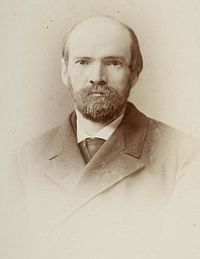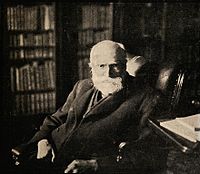Diego Barros Arana
Diego Jacinto Agustín Barros Arana (Santiago, August 16, 1830 - Santiago de Chile, November 4, 1907) was a Chilean educator, diplomat and historian, considered one of the leading liberal intellectuals of the XIX century. His masterpiece was the General History of Chile .
Family
He was the sixth child of Diego Antonio Barros Fernández de Leiva and Martina Arana Andonaegui. He lived in a wealthy home: his father had begun to make a fortune through trade and his mother was an Argentine lady with contacts with high society in Buenos Aires. He had Basque ancestry.
His mother died when he was barely 4 years old, so a paternal aunt took care of the home, giving him a very religious upbringing, for which he always maintained respect for the Catholic faith, despite losing it later.
Studies
He studied at the nuns' academy as an external student of the National Institute, being a classmate of Francisco Bilbao and the Amunátegui brothers. He was indoctrinated in Latin, grammar, philosophy, French and sacred history, but not in American history or of Chile, which was not yet taught, so his first contacts with history were made independently, by reading the Compendio de la historia civil, geográfico y natural by Abate Molina, the Memoirs by General William (Guillermo) Miller, the History of the Spanish-American Revolution by the Spanish Mariano Torrente, and the Physical and Political History of Chile by Claudio Gay.
First works
At the end of his school life he got closer to French literature, and made some translations, one of them the Caballero d'Harmental by Alejandro Dumas, was published by El Mercurio in 1849, accompanied by for an essay on the regency of the Duke of Orleans written by Barros Arana, which is strictly speaking his first work.
She continued to work with translations from the French language, but began to be closer to historical work. His debut as a historian was made in 1850, with an article in the newspaper La Tribuna about Túpac Amaru and his first historical book, Historical Studies on Vicente Benavides and the southern campaigns .
His second historical work would be the General History of the Independence of Chile, which was also promoted by Andrés Bello, who advised him against his fears: "Write young without fear, that in Chile no one reads". For four years (1854-1858) he developed tenacious work, which resulted in 4 volumes with a total of 1,931 pages, which earned him the appointment of a member of the Faculty of Philosophy and Humanities of the University of Chile. In 1854 Barros Arana married Rosario Izquierdo Urmeneta, with whom he would have 2 children.
Political and public career
Little by little, foreign and domestic influences led Barros Arana towards liberalism and he became actively involved in politics. Liberalism meant in many cases a fight against the church and the search for a secular state. Barros Arana was no exception, and although he did not go to extremes like other of his colleagues, he did have terrible confrontations with Catholic circles, because he thought that the backwardness of the church and its influence in society were disastrous for the development of the humanity. Many Catholics saw in him an enemy, declaring the fight after a harsh criticism by the historian of the exams of the Conciliar Seminary, beginning a series of replicas from their respective trenches, The Catholic Magazine for the church and The Railway for Barros Arana.
He was a tenacious opponent of the government of Manuel Montt, and fearing that he was involved in some subversive plan (for which there were good reasons, since he was actually hiding weapons in his home), they raided his house and he had to leave at exile. He went to Argentina, where he became friends with Bartolomé Miter and Manuel Ricardo Trelles, who helped him work comfortably in the archives and libraries of his country.
He traveled to Europe after his release. In 1863, back in the country, he was appointed rector of the National Institute, beginning a pedagogical career that would lead him to hold the deanship several times in the Faculty of Philosophy and Humanities of the University of Chile, as well as the rectory of that University (1893-1897).
His time at the institute triggered a storm that would break with the government alliance known as the Liberal-Conservative Fusion.
Abdón Cifuentes, as President Federico Errázuriz Zañartu's minister of public instruction, was embarked on the mission of having the law on freedom of examinations approved. This law would benefit private schools (mainly Catholic), which could take the university entrance exam in their own school and not before the professors of the National Institute, as was the case until then, which met with resistance from Barros Arana.
After the law was promulgated, there was a serious confrontation between the minister and the rector of the National Institute. The enemies of Barros Arana caused disorders within the institute, forcing him to dismiss him as rector, but he was appointed delegate of secondary education. But the two-headed government of the institute caused even more disorders within the institute that ended with the resignation of the new rector Camilo Cobo (already resigned from the ministry). Errázuriz censured this and ended with the position of secondary education delegate, automatically leaving Barros Arana without a position in the institute.
His anger and that of his supporters was directed at the minister of instruction, and an assault was organized on his home, which was happily repelled by police forces at the last minute. Outraged by this assault, and by the participation of liberals in it, the Conservative Party allowed Cifuentes, the only conservative in the cabinet, to resign. The government alliance was dead.
Subsequently, he dedicated himself to historiographical scholarship and to international assignments. He was sent to Argentina on a mission to define the boundaries between the two nations and solve the problem of unassigned Patagonia, then indigenous territory. Barros was in favor of not claiming the eastern sector, considering it a barren site that would waste Chilean energy.. Once the border problems were fixed, another would arise due to the definition of the experts, where he once again played an important role by presiding over the commission of experts, positioning them in the extreme south of Chile, where the conflicts existed.
But it would be in his role as historian where he would stand out the most. It would become the most important of the XIX century, for its magnum opus the “General History of Chile”, that recounts the entire history of the country from prehistory to 1830 in 16 volumes.
In addition to this work, he wrote others such as “Historical Studies on Vicente Benavides” (his first historical work) “General history of the independence of Chile", “A decade in the history of Chile”, Dr. Rodulfo Amando Philippi and many others.
Last years and death
In 1902 he had an outstanding participation in the General Congress of Education held in Santiago, which had an international character. He died on November 4, 1907 in Santiago. Certain authors (such as Sergio Villalobos [citation needed ] ) state that he suffered a heart attack when he was trying to explain to a child the difference between a thermometer and a barometer.
Pedro Nolasco Cruz Vergara says:
- It is very rare to find an author who knows well the limits of his wit, who promises only what he can accomplish and fulfills what he promises. This probity has its reward. He who exercises his powers in the sphere that corresponds to him and not the violent ones does not strive to apply them to objects that are not naturally within his reach, gets them unwraped or fortified to the degree and will do well when he does. That kind of writer belongs to Diego Barros Arana.
L. Rojas, about Diego Barros Arana, in Cultural Biography of Chile (reed. 1995)
- Barros Arana is the obligatory point, the precise reference, the synthesis of our past and the fundamental basis of how much work of this same nature has been edited later».[chuckles]required]
Tributes
- In 1907, after his death, President Pedro Montt ordered the National Board to carry the surnames of the historian for his educational contribution to the country, and to be called the Arana Barros National Board.
- A town in Teodoro Schmidt's commune bears its name.
- It is also carried by many streets and avenues of Chile, such as main streets of Concepción and Temuco.
Works
Note: Names are in modern spelling.
- Historical studies on Vicente Benavides and the Southern Campaigns: 1818-1822 (1850)
- General Freire (1852)
- General History of the Independence of Chile (4 tomos between 1854-1858)
- Volume I (1854)
- Volume II (1855)
- Volume III (1857)
- Volume IV (1858)
- Chiloé campaigns: (1820-1826) (1856)
- Life and travel of Hernando de Magallanes (1864)
- Elemental Compendium of American History (1865)
- Elements of physical geography (1871)
- Manual on literary composition (1871)
- Rice of the former Jesuits of Chile (1872)
- Pedro de Valdivia Process and other unpublished documents concerning this conqueror (1873)
- My dismissal: notes for the history of the National Institute (1873)
- Don Claudio Gay, his life and his works: Biographical and Critical Study (1876)
- Biographical traits of Don Melchor de Santiago (1883)
- General History of Chile (16 volumes between 1884-1902)
- Volume I (1884)
- Volume II (1884)
- Volume III (1884)
- Volume IV (1885)
- Volume V (1885)
- Volume VI (1886)
- Volume VII (1886)
- Volume VIII (1887)
- Volume IX (1889)
- Volume X (1889)
- Volume XI (1890)
- Volume XII (1893)
- Volume XIII (1894)
- Volume XIV (1897)
- Volume XV (1897)
- Volume XVI (1902)
- Elements of literature: rhetoric and poetic (1867)
- Compendium of Modern History (1888)
- Geographical Hydrographic Explorations of José Moraleda and Montero preceded by an introduction (1888)
- Literary Composition Manual (1889)
- Necrology of D. Juan G.Courcelle Seneuil (1892)
- Secondary education curriculum and curricula approved by the State lycée (1893)
- The question of limits between Chile and the Argentine Republic: the existing treaties, the minutes of the experts, the minutes of the arbitration, the map of the two border lines (1895)
- Doctor Rodolfo Amando Philippi: his life and his works (1904)
- A Decade of the History of Chile: (1841-1851)
- Volume I (1905)
- Volume II (1906)
- Historical-bibliographic studies (5 volumes between 1909-1911)
- Don José Francisco Vergara: biographical sketches through his parliamentary work his death and apotheosis (published in 1919)
List of works
- Chiappa, Víctor M. (1907). Bibliography of Don Diego Barros Arana. German print. pp. 112.
Contenido relacionado
1267
1392
5th century BC c.



